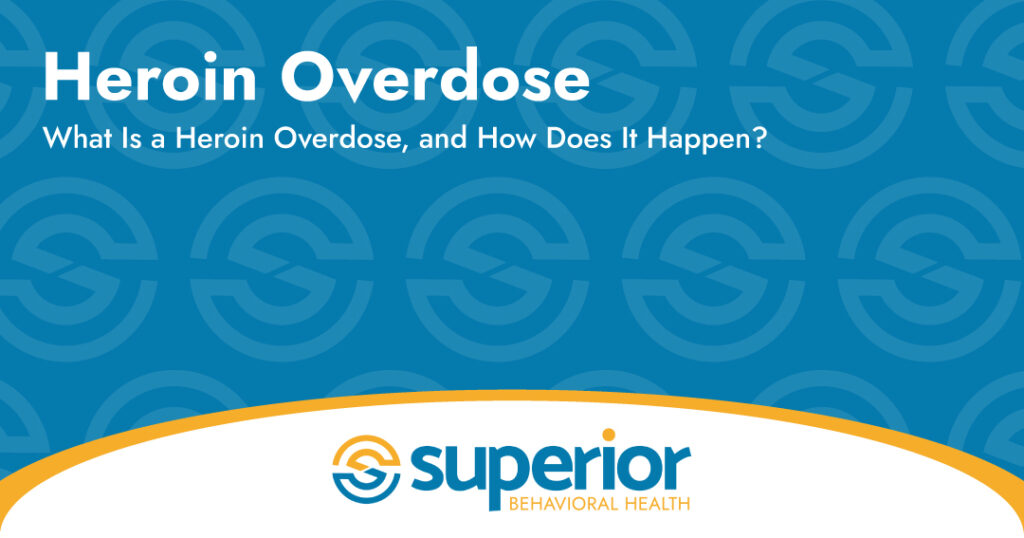You and your best friend would watch the Cleveland Browns play every week. Despite your team’s consistently lackluster performance, he would host a Superbowl party every year and you would always help him plan it. He was the life of the party, until eventually he wasn’t. As time passed, your best friend grew distant and lifeless compared to his former self. By the time the Browns’ record improved, he didn’t want to watch the games together anymore at all.
You didn’t realize he had a heroin use disorder until you got the terrible call from his wife: he was in the hospital due to a heroin overdose. He was still alive, but how could this happen?
Thankfully, overdoses due to heroin are declining. At the end of 2022, heroin was involved in less than 8% of unintentional drug overdose deaths in Cleveland, Ohio. Many people survive overdoses, or don’t overdose on heroin at all. Still, people seek heroin addiction treatment at Superior Behavioral Health every day, and a heroin overdose is always possible. Here’s everything you need to know about heroin overdoses, and what you can do to help stop them.
What Is A Heroin Overdose, And How Does It Happen?
A heroin overdose happens when someone takes more heroin than their body can handle. The feeling of euphoria that comes with heroin use can cause heroin use disorders, and a tendency to take even more heroin. This, and other factors, can lead to a heroin overdose.
Risk Factors For A Heroin Overdose: Who Is Most Likely To Overdose?
Using heroin is never safe. Even though overdosing on heroin alone is rare, it can still happen to anyone, even if they’re using heroin for the very first time. There are, however, some risk factors that indicate a higher likelihood of an overdose.
Most heroin overdoses happen not due to heroin, but due to mixing it with other substances. In some cases, people who buy heroin receive a mixture of substances that aren’t heroin at all. One of these common “fillers” in heroin is fentanyl, a medication 100 times stronger than morphine. Fentanyl is the leading cause of overdose deaths. The risk of an overdose also increases with the addition of substances such as alcohol, cocaine, and benzodiazepines.
People with heroin use disorders often need to take increasingly higher doses of heroin to achieve its desired euphoric effects with each use. While people feel they are growing more tolerant of heroin, the body itself is not any better at processing heroin than it was when the person first used heroin, which creates a bigger danger of an overdose.
People with untreated mental health conditions have a higher likelihood of developing substance use disorders in general. Due to the challenges their mental health conditions present, using substances as an “escape” can be tempting. With frequent opioid use, the brain grows used to synthetic opioids in the system and relies on them to help produce dopamine. Dopamine helps regulate mood, so without synthetic opioids like heroin in the body, people feel even more depressed than before they started taking heroin. This creates a vicious cycle of use, increasing the likelihood of a heroin overdose.

How To Know It’s An Emergency: Signs & Symptoms Of A Heroin Overdose
While signs of heroin use and heroin overdose can seem similar, it’s always best to assume the worst and seek medical help immediately if you see these symptoms in a person:
- Shallow, labored breathing
- Extremely small pupils
- Blueish skin, nails, lips, and tongue
- Weak pulse
- Unresponsiveness
- Confusion and disorientation
Death And Other Dangers Behind A Heroin Overdose
If a person experiencing a heroin overdose doesn’t receive medical attention, they will die. Seeking help as soon as possible in the event of an overdose is important not just to prevent death, but also because an overdose can cause additional effects on the body even if the individual survives. Some effects include the following:
- Organ damage
- Pneumonia or other respiratory complications
- Skin injuries (for those who fall unconscious on hard surfaces)
- Infections due to injection of heroin
What To Do If You Think Someone Is Experiencing A Heroin Overdose
The first thing to do in the face of a heroin overdose is to seek medical help immediately. Ohio’s Good Samaritan Law ensures anyone trying to help in the event of an overdose won’t face any legal trouble, so there’s no reason not to act.
A medication called naloxone is also available to reverse the effects of an overdose, though emergency medical attention is still required. If you have naloxone on hand, administering it to someone experiencing an overdose could save their life.

What Are The Treatment Options For A Heroin Overdose In Cleveland, Ohio?
Someone experiencing a heroin overdose needs emergency care immediately. After they’re stabilized, it’s likely time for them to seek treatment for a heroin use disorder. Partial hospitalization, outpatient, and intensive outpatient programs are all treatment options that can lead to recovery.
Superior Behavioral Health is an addiction treatment facility in Garfield Heights, Ohio. We are dedicated to helping people recover from substance use disorders, including heroin use disorder. We offer a variety of treatment options at our local facility, including medication-assisted treatment, partial hospitalization, outpatient, intensive outpatient, and mental health services. Give us a call at 216-435-1110 for more information on what we can do for you.


